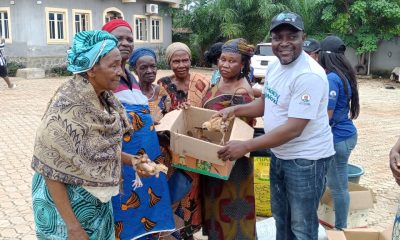NEWS
Oborevwori Launches $1bn Palm Oil Initiative for Economic Transformation

By Francis Sadhere, Delta
Delta State Governor, Rt. Hon. Sheriff Oborevwori yesterday unveiled a transformative agricultural initiative aimed at revolutionizing the state’s palm oil sector.
The Delta State Commercial Oil Palm Plantations Growers Cooperative Society Limited (DELCOM COOP) project is expected to attract nearly $1 billion in development finance over the next decade, positioning the state as a leader in Nigeria’s agricultural transformation.
The Governor made the announcement during the public presentation and launch of the DELCOM COOP/Delta State Oil Palm Plantations Development Land Bank and Agric Data in Asaba.
He said that the initiative would not only create thousands of jobs but also stimulate the local economy, making Delta a frontrunner in the global oil palm industry.
Oborevwori outlined the significance of the project in the context of his MORE Agenda, which aims to harness the immense potential of agriculture, particularly the oil palm sector, to foster sustainable development and wealth creation.
“This is a pivotal moment in the history of Delta State, where we seize an opportunity to make agriculture the cornerstone of our economic transformation,” he said.
The initiative builds on a partnership established in November 2018 with the Central Bank of Nigeria (CBN) as part of the CBN’s 10-year Oil Palm Development Initiative, which aims to restore Nigeria’s position as a global leader in oil palm production.
Delta State, as part of this initiative, has committed to contributing 100,000 hectares of farmland, with plans to access N120 billion through the CBN/Bankers Committee’s N500 billion funding facility.
Since the establishment of DELCOM COOP in August 2020, the project has seen rapid growth. From an initial 41 Limited Liability Companies and 1,971 smallholder farmers, DELCOM COOP has expanded to include 145 companies and 3,080 smallholder farmers.
The project’s success is attributed to its community-driven approach, with 68 host communities releasing 130,000 hectares of dormant land for cultivation, surpassing the initial target of 100,000 hectares.
Oborevwori said that 10% of the land would be reserved for indigenous communities, and 22% of the annual net profit from commercial operations would be reinvested into the communities. This model ensures that local residents are active participants, not just beneficiaries, of the project’s success.
As part of the DELCOM COOP initiative, six strategic hubs will be established for aggregating and processing Fresh Fruit Bunches (FFB) into high-value products such as palm oil, palm stearin, and organic fertilizer.
The first phase of the project aims to develop 30,000 to 35,000 hectares, with the establishment of two oil mills at an estimated cost of $150 million.
The Delta State Government has already approved a N25 billion ISPO guarantee for the first phase, demonstrating its commitment to the project’s long-term sustainability.
In addition, the project will incorporate the cultivation of intercrops such as cassava, maize, soybeans, and sorghum, which will be sold to appointed off-takers within the first 12 months of operation.
Oborevwori stressed the importance of stakeholder collaboration in ensuring the success of the project.
“This is not just a government project; it is a collective effort that requires the support of all stakeholders. Together, we will unlock the full potential of this sector and build a prosperous future for generations to come,” he said.
Secretary of DELCOM, Dr. Felix Okonti added that the DELCOM COOP initiative aims to lift two million Deltans out of poverty and create 15,000 millionaires and 1,080 billionaires by 2032.
He also revealed plans to secure $900 million in foreign private equity funding for the development of 100,000 hectares of plantations and six large-scale oil mills.
The DELCOM project is expected to generate over 288,700 jobs initially, with the potential to create one million jobs in the long term, further boosting Delta State’s economy and fostering development in rural areas.
With this groundbreaking initiative, Delta State is set to become a major player in the global oil palm industry, ushering in a new era of economic growth and sustainable development.
NEWS
Nigeria Customs Service Foils Smuggling Attempts, intercepted PMS worth over 95 million in Adamawa.

From Yagana Ali Yola
The Nigeria Customs Service, Zone D, Adamawa State, has made significant seizures of petroleum products and arrested suspects in various smuggling operations.
The seizures include 2,276 jerricans of Premium Motor Spirit (PMS) and 19 jerricans of Automotive Gas Oil (AGO), with a total Duty Paid Value (DPV) of ₦95,695,000.
The controller general of custom Bashir Adewale Adeniyi , who was represented by the commander operations whirlwind
HK Ejibunu said the smuggling operations were intercepted at various notorious smuggling flashpoints, including Malabu-Belel Axis, Girei-Wuro Bokki Axis, Gurin-Fufore Axis, Jamtari Axis, Maiha Axis, Jimeta Waterside, and Mubi-Sahuda Axis.
The petroleum products were carefully concealed and being prepared for illegal export or distribution to neighboring countries.
Earlier in his welcome address the controller Nigeria custom Adamawa/ Taraba command HB Bashir call on good people of Adamawa state to cooperate with the command in other to bring to an end the activity of the Economics saboteurs who snuggled PMS to the neighboring country of Cameron at detriment of Nigerian.
However, the Nigeria Customs Service reported a disturbing incident of a violent mob attack on its operatives while on duty. The officers were ambushed by violent mobs and smugglers who barricaded access roads and assaulted the officers. One of the attackers was fatally injured during the chaos.
The smuggling of PMS not only results in revenue loss for the country but also puts additional pressure on the already strained fuel supply chain. The Nigeria Customs Service is committed to curbing such illicit activities that threaten national security.
The Service is working with relevant security agencies to identify and bring all perpetrators to justice. The public is urged to support law enforcement activities by providing timely intelligence and standing against such wicked acts and criminalities.
The Nigeria Customs Service remains committed to its mission of protecting the nation’s borders and preventing economic sabotage. The Service condemns the violent attack on its operatives and reiterates its zero-tolerance stance toward violence and obstruction of official duty.
| ReplyReply allForwardAdd reaction |
NEWS
Group Empowers Women in 12 Akwanga Communities with Poultry Items.

From Abel Zwanke, Lafia
As part of its ongoing efforts to promote grassroots entrepreneurship and self-reliance, the Community Initiative for Character Moulding and Entrepreneurship Development (CiCMED), under its Future Planter Happy World Project, has empowered women in 12 communities across Akwanga Local Government Area of Nasarawa State with poultry starter kits.
The one-day community engagement, themed “Building Self-sufficiency and a Brighter Future for Nigerian Mothers and Children (Happy World),” was designed to equip rural women with the resources needed to establish and sustain small-scale poultry farming ventures.
Beneficiaries received 240 Nuellas (pullet chicks), poultry drinkers and feeders, and bags of chicken feed to aid their startups.
Speaking during the one Day distribution exercise on Wednesday, the programme coordinator, Mr. Kefas Tigga, said the empowerment was a deliberate effort to build economic resilience among women, particularly in underserved communities.
“This project is a response to the need for sustainable empowerment. We believe that by equipping women with these poultry items, they can generate income, support their families, and contribute meaningfully to local food production,” Tigga stated.
He acknowledged the vital support of Rt. Hon. Musa Ahmed Mohammed, the Nasarawa State Accountant General, who also holds the traditional title of Baraden Nasarawa, for his unwavering commitment to community development.
“We’re grateful to Rt. Hon. Musa Ahmed Mohammed, the Nasarawa State Accountant General, for his continued support for initiatives that promote economic growth and social impact at the grassroots,” he added.
One of the beneficiaries, Mrs. Amina Adamu, expressed her gratitude, describing the project as a life-changing intervention.
“This is the kind of support we need. With these birds and feeds, I can start something immediately. I’m very grateful,” she said.
CiCMED reaffirmed its dedication to closely monitoring the beneficiaries’ progress and pledged to extend the Future Planter Happy World Project to more communities across the state.
NEWS
Hepatitis: FCTA Screens Food Handlers

By Laide Akinboade, Abuja
In order to safeguard public health and food security in the Federal Capital Territory (FCT), the FCT Administration (FCTA) will soon commence a comprehensive hepatitis screening of food handlers, especially those working in restaurants, markets, bakeries, canteens.
The initiative is aimed at preventing hepatitis and other foodborne diseases, thereby protecting public health and empowering food businesses to operate with enhanced confidence and credibility.
This was contained in the FCT Minister, Nyesom Wike’s goodwill message, marking the World Hepatitis Day 2025.
The goodwill message delivered on behalf of the Minister by the Mandate Secretary, Health Services and Environment Secretariat, Dr Adedolapo Fasawe, reads in part, “Hepatitis A and E, primarily transmitted through contaminated food and water, can rapidly spread through poor hygiene practices, posing serious risks in our rapidly expanding and cosmopolitan city of Abuja.
“Furthermore, Hepatitis B and C, predominantly spread through blood and bodily fluids, still pose a risk in food environments where open wounds or poor hygiene are present.”
The FCT Minister described food handlers as an overlooked group whose role is pivotal in safeguarding public health.
“Therefore, the FCT Administration, committed to safeguarding public health and food security, is launching a strategic initiative to enhance food safety through comprehensive hepatitis screening of food handlers. This ambitious initiative is being scaled up through an innovative Public-Private Partnership (PPP) consortium, in alignment with the National Policy on Food Safety and Quality.
“This PPP consortium will combine efficiency, technical expertise, and funding capacity of the private sector with government oversight to implement regular and mandatory Hepatitis B and C screening for all food handlers within the FCT
“We urge all stakeholders, government agencies, private enterprises, healthcare providers, and food industry operators to actively support this transformative initiative through the mandatory hepatitis screenings for food handlers, promotion of free and effective Hepatitis B vaccination at public health facilities, enforcement of standardized food safety training inclusive of hepatitis awareness, rigorous enforcement of licensing, hygiene inspections, and medical screening requirements for food vendors and handlers and raising awareness and compassionately addressing the stigma surrounding hepatitis.
“To us, food handlers are not just service providers, they are essential public health stewards. Simple, consistent, and safe hygiene practices can significantly reduce hepatitis transmission.
“Therefore, let us break the silence. Hygiene cannot wait. Screening cannot wait. Action cannot wait. Together, let’s ensure that the FCT leads by example, turning our food industry into a symbol of health, safety, and excellence.”
| ReplyReply allForwardAdd reaction |



















